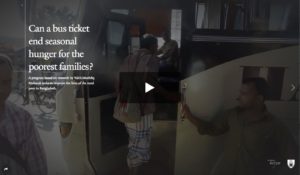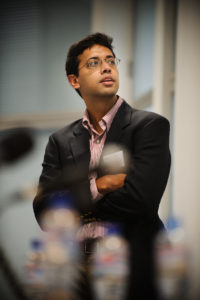Ahmed Mushfiq Mobarak is the Jerome Kasoff ’54 Professor of Management and Economics at Yale University with concurrent appointments in the School of Management and in the Department of Economics (Faculty of Arts and Sciences). Mobarak is the founder and faculty director of the Yale Research Initiative on Innovation and Scale (Y-RISE).
Mobarak has several ongoing research projects in Bangladesh, Sierra Leone, and Nepal. He conducts field experiments exploring ways to induce people in developing countries to adopt technologies or behaviors that are likely to be welfare-improving. He also examines the complexities of scaling up development interventions that are proven effective in such trials. For example, he is scaling and testing strategies to address seasonal poverty using migration subsidies or consumption loans in Bangladesh, Nepal, and Indonesia. This 15-minute presentation at the Nobel Symposium with accompanying slides summarizes his views on migration research. His research has been published in journals across disciplines, including Science, Nature, Econometrica, American Economic Review, Review of Economic Studies, BMJ, the American Political Science Review, PNAS, Marketing Science, and Demography, and covered by the New York Times, The Economist, NPR, BBC, NBC, The Washington Post, Wall Street Journal, Science, Nature, and other media outlets around the world. He received a Carnegie Fellowship in 2017 and was named to the inaugural Vox list of 50 “scientists working to build a more perfect future” in 2022.
Mobarak collaborated with the government of Bangladesh and other institutions to devise evidence-based COVID response strategies in 2020. He collaborated with governments and NGOs in India, Pakistan, Nepal and Bangladesh to distribute facemasks to over 100 million people during the Delta and Omicron waves in 2021, based on the results of the NORM model. He began collaborating with the government of Sierra Leone on vaccine distribution in 2022, and set up an institutional partnership with WHO in 2023 to work on behavioral sciences for public health in Jamaica, Sierra Leone and other WHO member states. This 15-minute presentation at the World Bank summarizes his COVID-period work in developing countries
At Yale he teaches Ph.D. courses in development economics, in urban and environmental economics, as well as a core MBA course on interactions between business, government, and society that does deep dives on contemporary policy issues on race, gender, immigration, and public health. This interview describes his approach to research. His comments to the World Health Organization Director General at the 75th World Health Assembly provide a succinct verbal summary:

Research Briefs |












